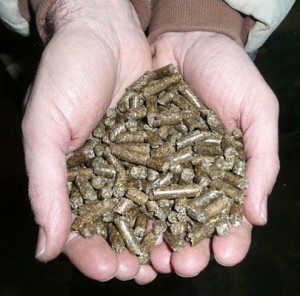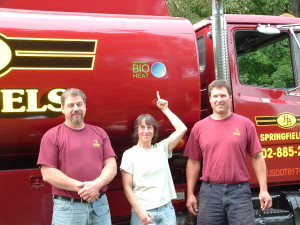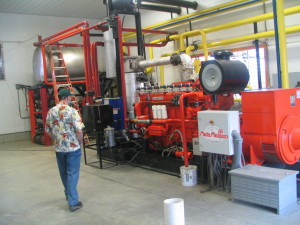The Vermont Bioenergy Initiative focuses on oilseeds for biodiesel, grass for heating, and algae for biodiesel by investing small grants into research, technical assistance, and infrastructure development for these emerging technologies. The full universe of bioenergy options for Vermont, however, includes other more established feedstocks and technologies like wood for thermal energy and combined heat and power, commercial biodiesel for transportation and heating, and biodigesters. Profiles, publications, and helpful links are given below for these important sources of bioenergy.
Wood Chips
 Wood chips are small rectangular pieces of wood that can be used for heating and cooling, electric generation, or combined heat and power (CHP) systems. Wood chips are a product of forest harvesting and are typically made from low-grade wood or tops and limbs removed from higher-quality sawlogs. Wood chips are delivered by tractor trailer and stored on-site in a large bin from where they are fed into a boiler for combustion. The heat produced from combustion can be used to heat or cool space or to run a turbine and generator to produce electricity. Wood chip fuel is ideal for community-scale buildings like schools, community centers, and hospitals or for campuses and community district energy systems. Vermont has more than 40 schools heated with wood, two wood electric generating stations, several campus heating systems, and several district energy systems including the largest in the capitol city, Montpelier.
Wood chips are small rectangular pieces of wood that can be used for heating and cooling, electric generation, or combined heat and power (CHP) systems. Wood chips are a product of forest harvesting and are typically made from low-grade wood or tops and limbs removed from higher-quality sawlogs. Wood chips are delivered by tractor trailer and stored on-site in a large bin from where they are fed into a boiler for combustion. The heat produced from combustion can be used to heat or cool space or to run a turbine and generator to produce electricity. Wood chip fuel is ideal for community-scale buildings like schools, community centers, and hospitals or for campuses and community district energy systems. Vermont has more than 40 schools heated with wood, two wood electric generating stations, several campus heating systems, and several district energy systems including the largest in the capitol city, Montpelier.
Profiles
- Biomass Energy Resource Center, When a Biomass Project’s “Champions” are Teenagers, 2009.
- Biomass Energy Resource Center, Middlebury College’s Biomass Heating and Cooling Plant Aims to Cut Carbon and Costs – in Big Ways, 2009.
- Biomass Energy Resource Center, One Woodchips Supplier’s Story of Investment, Market Building, and Success, 2010.
- Biomass Energy Resource Center, Former Sawmill Business Now Grows with the Market, 2008.
- Biomass Energy Resource Center, How a Chip System’s Savings Made a Housing Complex Affordable Again, 2008.
- Alexander M. Evans, Synthesis of Knowledge from Woody Biomass Removal Case Studies, September 2008.
Publications
- Biomass Energy Resource Center, Woodchip Heating Fuel Specifications, 2011.
- Biomass Energy Resource Center, Wood Boiler Systems Overview, 2011.
- Biomass Energy Resource Center, Particulate Matter Emissions-Control Options for Wood Boiler Systems, 2011.
- Biomass Energy Resource Center, Vermont Wood Fuel Supply Study, 2010 Update.
- Forest Guild Biomass Working Group, Forest Biomass Retention and Harvesting Guidelines for the Northeast, May 2010.
- Timothy M. Maker, Wood-chip Heating Systems: A Guide for Institutional and Commercial Biomass Installations, Revised 2004.
- Northern Forest Biomass Energy Initiative, Northern Forest Biomass Energy Action Plan.
- Biomass Energy Resource Center, Forming, Financing, and Permitting a District Energy Facility in Vermont, August 2009.
- Robert T. Perschel, A Market-Based Approach to Community Wood Energy: An Opportunity for Consulting Foresters, November 2008.
- Manomet Center for Conservation Sciences, Manomet Study of Woody Biomass Energy, June 2010.
Links
- Biomass Energy Resource Center
- Biomass Thermal Energy Council
- National Database of Community-scale Biomass Systems
- US Endowment for Forestry and Communities, Wood to Energy
- Forest Guild, Biomass
- National Renewable Energy Laboratory, Biomass
- Northeast Regional Biomass Program
- State University of New York (SUNY), College of Environmental Science and Forestry, Willow/Woody Biomass Production Program
- PennState, Biomass Energy Center
- USDA Forest Service, Forest Inventory and Analysis Program
Wood Pellets
 Wood pellets are made from wood chips and shavings compressed under high heat and pressure. The natural lignin in wood hardens during the cooling process to hold the pellet in shape and give it a sheen. Wood chips are sourced from forest harvesting and shavings typically are sourced from primary and secondary wood processors, like sawmills and furniture mills. Wood pellets are used for heating buildings like residences (using stoves or boilers) or small community buildings like elementary or rural schools, churches, town offices, and co-housing developments (using boilers).
Wood pellets are made from wood chips and shavings compressed under high heat and pressure. The natural lignin in wood hardens during the cooling process to hold the pellet in shape and give it a sheen. Wood chips are sourced from forest harvesting and shavings typically are sourced from primary and secondary wood processors, like sawmills and furniture mills. Wood pellets are used for heating buildings like residences (using stoves or boilers) or small community buildings like elementary or rural schools, churches, town offices, and co-housing developments (using boilers).
Profiles
- Biomass Energy Resource Center, A Sanctuary’s Modest Pellet Boiler Will Help Test Local Field Grasses, 2009.
- Biomass Energy Resource Center, At a Super-Efficient Industrial Site, Pellet Boilers are the Choice, 2009.
- Biomass Energy Resource Center, Danish School’s Pellet Heat Saves on Cost and Adds Comfort, 2009.
- Biomass Energy Resource Center, Serving a Dense Residential Complex with a Pellet Boiler, 2009.
Publications
- Massachusetts Division of Energy Resources, A Reference on Wood Pellet Fuels and Technology for Small Commercial & Institutional Systems, 2007.
- Biomass Energy Resource Center, Addison County [VT] Pellet Feasibility Study, November 2009. (File name: BERC_Pellet-Mill_ Report_2009)
- Biomass Energy Resource Center, A Feasibility Study of Pellet Manufacturing in Chittenden County, Vermont, August 2011.
- Biomass Energy Resource Center, Wood Boiler Systems Overview, 2011.
- Northern Forest Biomass Energy Initiative, Northern Forest Biomass Energy Action Plan, .
- Biomass Energy Resource Center, Particulate Matter Emissions-Control Options for Wood Boiler Systems, 2011.
- Biomass Energy Resource Center, Vermont Wood Fuel Supply Study, 2010 Update.
Links
- Biomass Thermal Energy Council
- National Database of Community-scale Biomass Systems
- US Endowment for Forestry and Communities, Wood to Energy
- Forest Guild, Biomass
- National Renewable Energy Laboratory, Biomass
- Northeast Regional Biomass Program
- State University of New York (SUNY), College of Environmental Science and Forestry, Willow/Woody Biomass Production Program
- PennState, Biomass Energy Center
- USDA Forest Service, Forest Inventory and Analysis Program
- Vermont Wood Pellet Company
Commercial Biodiesel
 Biodiesel is commercially available in Vermont for home heating, transportation, and diesel-powered equipment. The biodiesel available today is recycled cooking oil that is refined for use in engines and home heating appliances. Biodiesel can also be blended with traditional fossil fuels.
Biodiesel is commercially available in Vermont for home heating, transportation, and diesel-powered equipment. The biodiesel available today is recycled cooking oil that is refined for use in engines and home heating appliances. Biodiesel can also be blended with traditional fossil fuels.
Profiles
- Bourne’s Energy: A Biodiesel Blending Plant (an article)
- Biodiesel Fleets Enter Vermont’s Fast Lane (an article)
Publications
- Spring Hill Solutions/Vermont Sustainable Jobs Fund, Vermont Biodiesel Supply Chain Study. April 2011.
- Eric Garza, The Energy Return on Invested of Biodiesel in Vermont. April 2011.
- N. White/Vermont Sustainable Jobs Fund, Report to the Legislature on Biodiesel Production and Use in Vermont. 2009.
- Emily J. Stebbins. Technical and Economic Feasibility of Biodiesel Production in Vermont: Evidence From a Farm-Scale Study and a Commercial-Scale Simulation Analysis. May 2009.
- Vermont Biofuels Initiative: Local Production for Local Use to Supply a Portion of Vermont’s Energy Needs. .May 2009
- NEED Project, Transportation Fuels: Biodiesel. Information and Activities to Teach Students about Biodiesel as a Transportation Fuel, Grades 4-12. 2008-09.
- K. Mulder, G. Wilkerson, E. Stebbins, Homegrown Fuel: Economic Feasibility of Commercial-Scale Biodiesel Production in Vermont. 2007.
- Worldwatch Institute, Biofuels for Transportation: Global Potential and Implications for Sustainable Energy and Agriculture in the 21st Century. June 2006.
- E. Delhagen/Vermont Sustainable Jobs Fund, Vermont Biodiesel Project: Building Demand in the Biofuels Sector. 2006. (See also Executive Summary)
- Biofuels Association for Vermont Sustainable Jobs Fund, Laboratory and Field Testing of Biodiesel in Residential Space Heating Equipment. 2006.
- The Vermont Biodiesel Project: Department of Buildings and General Services: Emissions Testing of Biodiesel Blends With #6 Fuel Oil at the Waterbury State Office Complex.. September 2006
Links
- Bourne’s Energy (Morrisville, Vermont)
- Consumer Energy Center, California Energy Commission, Biodiesel for Transportation
- Biodiesel Magazine
- National Biodiesel Industry
- National Biodiesel Board
Biodigesters
 Manure, food scraps, landfill waste, and other organic matter produce a biogas comprised mostly of methane and carbon dioxide during decomposition. Referred to as anaerobic digestion, biogas can be used as both a heat and electricity clean energy source. Through a combustion process, the methane and carbon dioxide gas combination generates a heating fuel as well as a power source to drive electric generators. Combined heat and power gas engines and other projects utilizing both technologies can use organic biomass for both power and heart. The removal of additional gasses and upgrading to a natural gas quality biomethane cleans the biogas for use in transportation.
Manure, food scraps, landfill waste, and other organic matter produce a biogas comprised mostly of methane and carbon dioxide during decomposition. Referred to as anaerobic digestion, biogas can be used as both a heat and electricity clean energy source. Through a combustion process, the methane and carbon dioxide gas combination generates a heating fuel as well as a power source to drive electric generators. Combined heat and power gas engines and other projects utilizing both technologies can use organic biomass for both power and heart. The removal of additional gasses and upgrading to a natural gas quality biomethane cleans the biogas for use in transportation.
Profiles
- Anaerobic Digestion, Cornell University
Publications
- Nora Goldstein, Farm Digester Evolution In Vermont, BioCycle. February 2013
- Guy Roberts/Intervale Innovation Center, Small-Scale Manure Digesters: Potential For On-Farm Heat And Energy.
- Vermont Land Trust, Alternative Energy on the Farm: Methane Digesters. Fall 2008.
- Dan Scrutin/Vermont Agency of Agriculture, Vermont’s Experience with the Adoption of Anaerobic Digesters on Farms. November 2007.
- Cornell University, Manure Management Program, A Guideline for Co-Digestion of Food Wastes in Farm-based Anaerobic Digesters. 2004.
- Cornell University Cooperative Extension, Anaerobic Digestion Fact Sheet. December 2004.
Links
- Vermont Technical College, Biodigester
- Middlebury College, Considering a Biodigester
- Cornell University, Anaerobic Digestion
- Penn State Extension, Biogas and Anaerobic Digestion
- eXtension, Introduction to Biogas and Anaerobic Digestion




